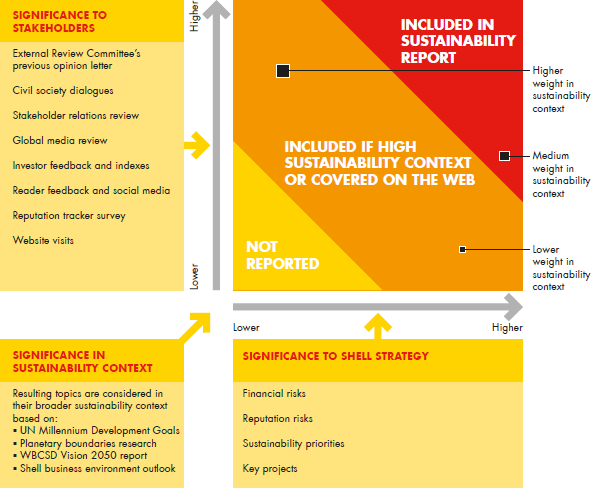We began reporting voluntarily on our environmental and social performance with the first Shell Report that covered 1997. Our reporting focuses on the environmental and social challenges that most affect business performance and matter most to our key stakeholders. These include local communities, non-governmental organisations, shareholders, investors, customers, partners, governments, employees, media, academics, contractors and suppliers. We use a thorough process to select content for our reporting (see diagram, below).
Throughout the year we also provide information to organisations that help investors understand the economic, environmental and social performance of companies, including the Carbon Disclosure Project.
Internal controls such as audit trails and statistical checks help assure the accuracy of the Shell Sustainability Report. An External Review Committee of independent experts helps make sure our reporting is balanced, relevant and responsive to stakeholders’ interests. Lloyd’s Register Quality Assurance Ltd has provided limited assurance of our direct and indirect greenhouse gas emissions data for 2011.

We report in accordance with the Global Reporting Initiative (GRI) and in line with oil and gas industry guidelines developed by the International Petroleum Industry Environmental Conservation Association (IPIECA), the American Petroleum Institute (API) and the International Association of Oil & Gas Producers (OGP). GRI confirmed our A+ reporting level for the information in the Royal Dutch Shell plc Sustainability Report for 2011, Annual Report and Form 20-F for 2011, and on our corporate website. www.shell.com/gri www.shell.com/ipieca

Shell supports the UN Global Compact and its 10 principles covering human rights, labour, environment and anti-corruption. Sections of this Sustainability Report cover Shell’s progress in these areas in 2011. Learn more about our contribution to the UN Global Compact at: www.shell.com/globalcompact
You can find more information on our sustainability reporting at:
www.shell.com/sdreporting
Find out more about Shell and sustainable development at:
www.shell.com/sustainability

CONTENT SELECTION PROCESS
STEP 1: Identify and understand topics of signifcance to our stakeholders through a range of stakeholder engagements and reviews.
STEP 2: Identify topics of signifcance to Shell’s business strategy through our established internal processes.
STEP 3: Combine the results into a matrix and assess each topic in terms of its wider economic, environmental and social impact. Each topic is then assigned a weighting according to its signifcance in “sustainability context”. To determine “sustainability context” we review authoritative research and forecasts on environmental and social topics published by public institutions and governmental organisations.
STEP 4: We include all the highest priority topics in our report. Those at the next level of importance are included if they have a higher weight in “sustainability context”, otherwise they are covered on the Shell corporate website.
STEP 5: Our External Review Committee reviews the content selection to ensure that coverage is complete, relevant and balanced.




